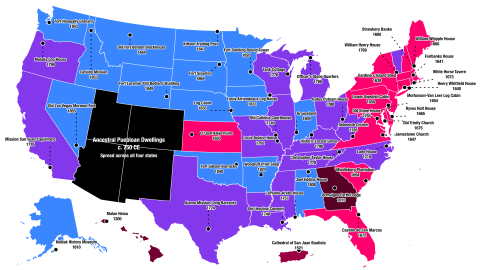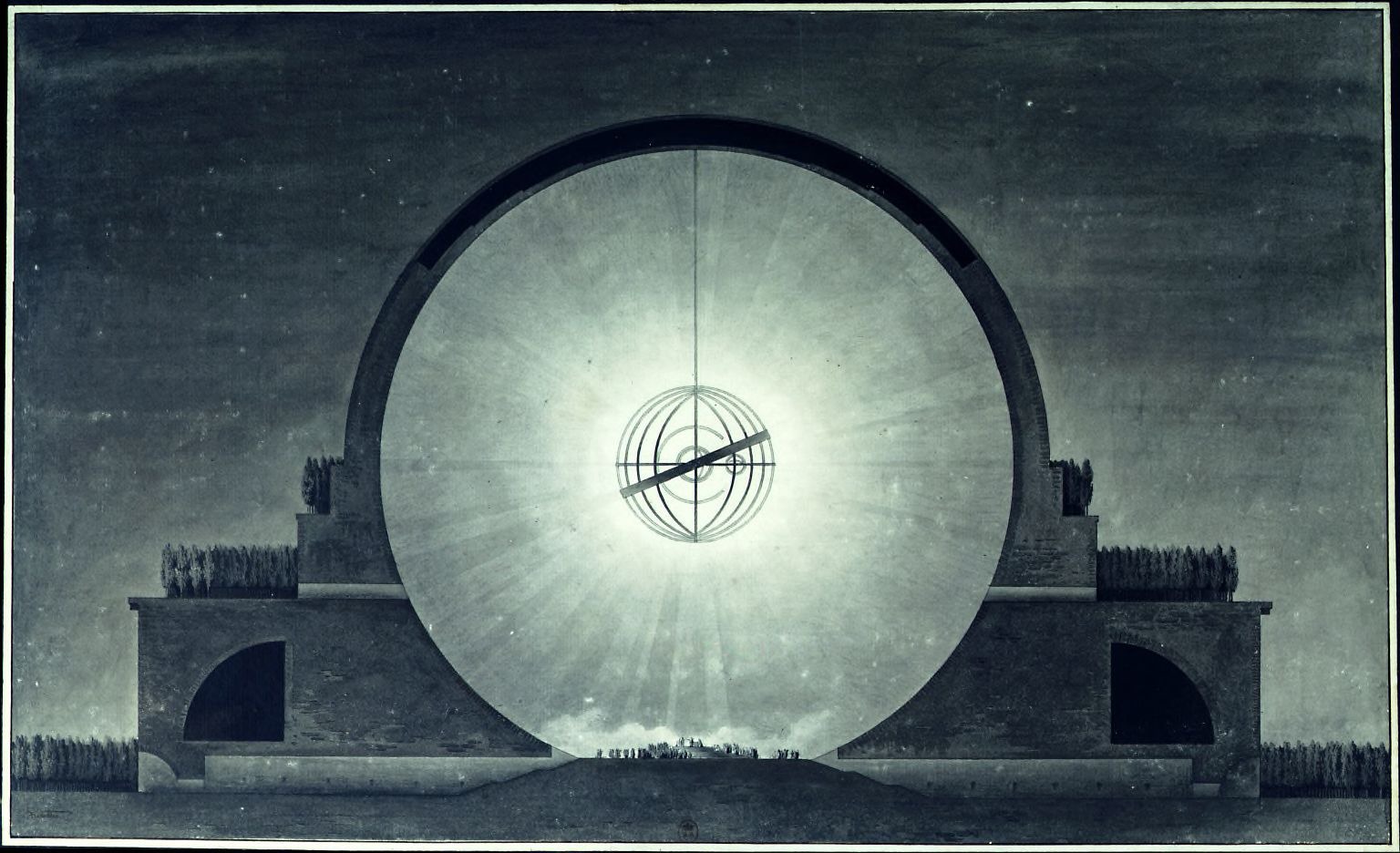How young is the oldest building in your state?

Credit: Malcolm Tunnell, reproduced with kind permission
- How old is the oldest building in your state? This map will tell you.
- While the East Coast has some pretty ancient stuff, the oldest buildings elsewhere are many centuries older.
- The Pueblo dwellings in the Four Corners states go back to 750 CE.

The White Horse Tavern in Newport, the oldest drinking establishment in the United States. Credit: Kenneth C. Zirkel, CC BY-SA 4.0CC BY-SA 4.0
What’s the difference between a European and an American? Well, there are many, but here’s a good one: for a European, 100 miles is far; for an American, 100 years is old.
It’s a cliché with some truth to it. In Europe’s political and cultural mosaic, 100 miles may put you in a different country, among people with whom you don’t even share a language. Consequently, most Europeans are not keen to move too far away from home.
America, on the other hand, was built by and for people with the moving itch. In 2018, 1 in 10 Americans moved home. Of those, 15 percent moved to another state.
However, what Europe’s human geography lacks in long distances, it makes up for in longevity. In Ireland, for example, you can drink at Sean’s Bar, which has stood near the banks of the Shannon since the year 900 (for more ‘oldest companies’, see #1042).
By comparison, the oldest drinking establishment in the United States, the White Horse Tavern in Newport, Rhode Island has only just opened its doors: it’s from the late 18th century, which means it’s not even three and a half centuries old.
As demonstrated by this map of the oldest buildings for each U.S. state (plus Puerto Rico), most of the nation’s ancient real estate is even younger: 15 buildings are from the 19th century, 18 are from the 18th century. A further dozen places on the map were built by conquerors and colonizers after the European arrival in the Americas, clocking in at half a millennium or less.
The really old stuff is of Native origin – the oldest even predates the Irish drinking establishment by a century and a half. What’s remarkable, however, is that there is so little of it. Only six states have Native American (or Hawaiian) structures as their oldest buildings.
A few non-sinister reasons can be adduced. Many Native tribes led itinerant lives, without the need for permanent dwellings; and those that did settle down often built houses out of wattle, wood and other matters that easily decay.
However, the preponderance of ‘European’ buildings also masks a grimmer truth. Many Native structures were abandoned and fell into disrepair or oblivion when the Europeans arrived, or were destroyed outright.

Due to the definition used, Native structures that don’t qualify as buildings have not been included on the map.Credit: Malcolm Tunnell, reproduced with kind permission
An argument may be had about the criteria for inclusion. It defines a ‘building’ as a free-standing, human-made structure used at least at some point for residential purposes, and still standing today.
That excludes a lot of older mounds of Native origin, such as the Etowah Indian Mounds (near Atlanta) and Monks’ Mound (near St Louis). However, it is unclear why the list should include a number of churches, which never had an appreciable residential function.
Finally, this list, culled from the National Register of Historic Places and–gulp–Wikipedia is not without its problems. Some of the datings are disputed, and in several cases, states have competing candidates for ‘oldest building’.
All that being said, the map does present a clear lesson. Leave the states with Native buildings out of the equation, and a familiar pattern becomes visible. The oldest structures are on the Eastern Seaboard, next up are what is now the Midwest and the Pacific coast. Then comes the ‘Wild’ west, the last frontier. This is the story of westward expansion and fulfillment of Manifest Destiny.
But the map also reveals traces of an older, less familiar narrative. The Ancestral Puebloans were already carving out their desert mansions around 750 CE, before there even was an England. We know little of the culture that built the Ocmulgee Earthlodge in Georgia around the year 1000. The Malae Heiau barely escaped bulldozing, despite being at least 800 years old. These Native structures, what few remain, contradict the well-worn story – or complete it, if you will.
Here’s an overview of all the places on the map, from youngest to oldest.

Magazine at Fort Sisseton, the oldest building complex in South Dakota.Credit: Ammodramus, Public Domain.
1864 – South Dakota: Fort Sisseton, Lake City
The ‘youngest’ oldest building of any state. Named after a local Indian tribe, this fort is located atop the Coteau des Prairies, an excellent defensive position.
1855 – Nevada: Old Mormon Fort, Las Vegas
The first permanent structure in what is now Las Vegas was an adobe fort built by Mormons, sent out from Utah to set up a new stronghold for the Latter-Day Saints. That didn’t quite go as planned.
1853 – Idaho: Cataldo Mission, Cataldo
The Mission of the Sacred Heart in Cataldo was built by Catholic missionaries to the tribe of the Cœur d’Alene tribe. A picture of this mission hangs in the Brumidi Corridors of the US Capitol.
1849 – Wyoming: Fort Laramie, Goshen
Founded as a private fur trading station, later repurposed as a military fort.
1844 – Montana: Old Fort Benton Blockhouse, Fort Benton
Once the terminus of the Mullan Road, which linked the Missouri and Columbia rivers, and the last fur trading post on the Upper Missouri River.
1843 – North Dakota: Kittson Trading Post, Walhalla
This is the only surviving of three trading posts built by, Norman W. Kittson, trader for the American Fur Company. It was later used as stables for a local hotel.
1843 – Washington: Fort Nisqually granary, Tacoma
Founded in 1833 and currently located in Point Defiance Park, Fort Nisqually is the oldest European settlement on Puget Sound. The granary is its oldest surviving building.
1840 – Oklahoma: Fort Gibson Barracks, Fort Gibson
In competition for the title of oldest building in the state with the Cherokee National Supreme Court Building in Tahlequah.
1835 – Nebraska: log cabin, Bellevue
According to legend, this log cabin was built as an outpost of John Jacob Astor’s legendary American Fur Company. Due to a cholera outbreak, it was moved away from the Missouri River, and in 1850 it was relocated to its present position, near the Old Presbyterian Church.
1833 – Iowa: Louis Arriandeaux Log House, Dubuque
The log cabin originally stood at 2nd and Locust Streets in Dubuque but has since been moved twice. The oldest building in Iowa, once home to pioneer settler William Newman, can now be found on the grounds of the Mathias Ham House.

Grouseland was built by William Henry Harrison before he became the 9th president of the United States. Credit: Nyttend, Public Domain.
1824 – Arkansas: Woodruff Print Shop, Little Rock
In the late 1810s, New Yorker Andrew Woodruff moved to Arkansas, where he would publish the Arkansas Gazette. From 1824, he lived and worked in the print shop that is now part of the Historic Arkansas Museum.
1820 – Minnesota: Fort Snelling Round Tower, St Paul
When Fort Snelling was completed in 1825, this tower–built at the confluence of the Mississippi and Minnesota rivers–was already five years old. The Fort’s aim was to keep British influence out of what was then the Northwestern United States and it was in service until 1858.
1810 – Alaska: Baranov Museum, Kodiak
Originally built as a warehouse for the Russian-American Trading Company in Kodiak, the oldest Russian settlement in Alaska. The building housed workers in the 19th century, was the site of a murder in 1886, and is supposedly haunted.
1808 – Alabama: Joel Eddins House, Huntsville
Originally built in Ardmore, this log cabin was moved to its current location in 2007.
1804 – Indiana: Grouseland, Vincennes
William Henry Harrison was not only the 9th president of the United States, but also the builder of what has turned out to be the oldest building in Indiana. He built Grouseland, a brick mansion, in 1804 when he was governor of the Indiana Territory. He lived there until 1812, when he took command of American forces in the Northwest Territory in the war with the British.
1799 – Oregon: Molalla Log House, Molalla
Built by fur traders of French-Canadian and/or Native American origin.
1792 – Missouri: Louis Bolduc House, Sainte Genevieve
Ste Genevieve is Missouri’s oldest European settlement, founded by the French and named after the patron saint of Paris. The oldest house in town was built by Louis Bolduc, trader, miner, planter, and a descendant of Louis XIV’s apothecary.
1790 – Kentucky: Historic Locust Grove, Louisville
In the running for oldest building in Kentucky, in close competition with the Old Providence Church in Winchester, John Andrew Miller House near Georgetown, and others. Lewis and Clark were officially welcomed back here in November 1809, after their western expedition.
1788 – Ohio: General Rufus Putnam House, Rutland
Named after Rufus Putnam, a Revolutionary War general who helped found Marietta, Ohio. Now a B&B.

The Old Ursuline Convent in New Orleans.Credit: Carol M. Highsmith / Library of Congress, Public Domain.
1785 – West Virginia: Rehoboth Church, Monroe County
A log cabin outside the town of Union, built as a Methodist church, is now a National Methodist Shrine.
1780 – Michigan: Officers’ Stone Quarters, Mackinac Island
The Officers’ Stone Quarters are the oldest part of Fort Mackinac, an originally British fort on Mackinac Island that was turned over to the Americans in 1796.
1778 – Tennessee: Christopher Taylor House, Jonesborough
Built by Christopher Taylor, a veteran of the French and Indian War and the Revolutionary War. Andrew Jackson lived in it in 1788-1789 while practicing law in Jonesborough. Possibly the oldest house in the state; another candidate is the Carter Mansion in Elizabethton.
1776 – Wisconsin: Tank Cottage, Green Bay
Built by French-Canadian fur trader Joseph Roi on the Fox River, purchased in 1850 by Nils Otto Tank, a Norwegian missionary.
1776 – California: Mission San Juan Capistrano, San Juan Capistrano
The mission survived dereliction, earthquakes, revolution, and expropriation. In 1910, it was the backdrop for “The Two Brothers” by D.W. Griffith, the first movie shot in Orange County. The mission of San Juan Capistrano is famous for the swallows that return here each spring. Mission San Diego de Alcalá (est. 1769) was the first in California and is thus older; but none of the original buildings survive.
1769 – Vermont: William Henry House, Bennington
Built for Elnathan Hubbell and reworked around 1797 for William Henry, a locally prominent politician whose son went on to become a U.S. Congressman. Now operating as a B&B.
1765 – Washington DC: Old Stone House
When it was built, the Old Stone House stood in the British colony of Maryland. The building was preserved out of reverence for the city’s founders – by accident. It was thought this was where George Washington met with Pierre L’Enfant, who designed the DC street grid. But it turns out this was not Suter’s Tavern. At the time, this was a clock shop, owned by the tavern holder’s son, John Suter Jr.
1757 – Mississippi: LaPointe-Krebs House, Pascagoula
Also known as the Old Spanish Fort, this house is the oldest structure in the entire Mississippi Valley.
1748 – Louisiana: Old Ursuline Convent, New Orleans
The convent was spared destruction by a city-wide fire, which stopped just a street short of the building, perhaps thanks to the nuns’ prayers to Our Lady of Prompt Succor. Prayers are still addressed to her when hurricanes and other disasters threaten the city.
1740 – Illinois: Old Cahokia Courthouse, Cahokia
Built in the 1730s by the French as a house, it has been used as a courthouse since 1793 and is most famous as the headquarters for Lewis and Clark around 1803 when planning their expedition.

The Castillo de San Marcos, as seen from above.Credit: Daniel Cring, CC BY-SA 4.0.
1724 – Texas: Alamo Mission Long Barracks, San Antonio
The oldest extant part of the Alamo, which was founded as a Spanish mission but is best remembered for the Battle of the Alamo (1836), which played an important role in Texan independence from Mexico.
1718 – North Carolina: Lane House, Edenton
Steve and Linda Lane didn’t know how old their house was until they had it renovated. Behind the cheap wall paneling, the workers found 18th-century timber structures.
1694 – South Carolina: Middleburg Plantation, Berkeley County
This two-story frame house was built by Benjamin Simons, a French Huguenot planter, and is still owned by his descendants.
1675 – Maryland: Old Trinity Church, Church Creek
An Anglican church since 1692, the building has been Protestant Episcopal since the Revolution. The cemetery holds the remains of several revolutionary war heroes.
1673 – Rhode Island: White Horse Tavern, Newport
Not just the oldest building in the state, also the oldest bar in the entire country. In the spirit of its age, the tavern is still lit by oil lamps and candles.
1672 – Florida: Castillo de San Marcos, St Augustine
The Spanish-built Caste of St Mark is the only surviving 17th-century military structure in the United States. It is also the country’s oldest masonry fortress. It is located in St Augustine, the oldest continuously inhabited European settlement in the continental United States.
1665 – Delaware: Ryves Holt House, Lewes
Built by Dutch settlers but named after the first Chief Justice of Delaware, who bought it in 1723.
1660 – Maine: William Whipple House, Kittery
Birthplace of General William Whipple, one of the signers of the Declaration of Independence.
1650 – Kansas: El Quartelejo ruins, Lake Scott S.P.
The northernmost Native American pueblo and the only one in Kansas, established by a group that left New Mexico. In 1706, the Spanish conquered the area and forced the inhabitants back. The structure was rediscovered in 1898 and is now part of a State Park.
1650 – Pennsylvania: Lower Swedish Cabin, Drexel Hill
Now on the outskirts of Philadelphia, this cabin was built by Swedish immigrants as a trading post. It has since served various purposes, including film set and girl scout meeting house.

Thousand-year-old Puebloan structures built adjacent the living rock, creating buildings that stood the test of time.Credit: au_ears, CC BY-SA 2.0.
1647 – Virginia: Jamestown Church, Jamestown
Only the tower dates from the 16th century, the rest of this building in Historic Jamestown park is actually the sixth version of the original. In one of those, Pocahontas and John Rolfe got married.
1641 – Massachusetts: Fairbanks House, Dedham
Fairbanks House is the oldest still standing wooden structure in North America. It was built for Jonathan Fairbanks, a tradesman, and his family. His descendants continued to live in the house well into the 20th century.
1640 – Connecticut: Henry Whitfield House, Guilford
Built for the Reverend Henry Whitfield, a Puritan leader and the founder of Guilford. This is the oldest stone house in all of New England.
1639 – New York: Gardiners Island shed, Gardiners Island
A wooden shed purportedly built when Lion Gardiner bought the island from Montaukett chief Wyandanch. Located off the tip of Long Island, Gardiners Island is still owned by Gardiner’s descendants. It is one of the largest private islands in the U.S. In June 1699, Captain Kidd buried treasure here (it has since been retrieved – you’re too late).
1600 – New Hampshire: Strawbery Banke, Portsmouth
Not a single building but an entire historic district, featuring around 40 restored buildings. Saved from redevelopment in the 1950s, the area opened as a museum in 1965.
1521 – Puerto Rico: Cathedral of San Juan Bautista, San Juan
Extensively added to and renovated since its inauguration almost five centuries ago, this is the oldest church in the United States and its territories.
1200 – Hawaii: Malae Heiau, Wailua River S.P.
The largest heiau (Hawaiian temple) on Kauai, one of the largest surviving temple platforms in all of Hawaii, as well as the oldest building still in existence in the state.
1015 – Georgia: Ocmulgee Earth Lodge, Macon
A reconstructed ceremonial lodge originally built a millennium ago by the South Appalachian Mississippian culture on a site with evidence of 17,000 years of continuous human habitation. It is now part of the Ocmulgee Mounds National Historical Park.
Ca. 750 – Arizona, Colorado, New Mexico Utah: ancestral Puebloan dwellings
Hundreds of stone and adobe dwellings, often constructed in canyon walls, scattered throughout the Four Corners states. Most were abandoned around 1300 due to climate change.
Map by Malcolm Tunnell, reproduced with kind permission. See the original context here.
Strange Maps #1062
Got a strange map? Let me know at [email protected].





